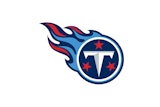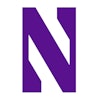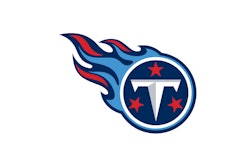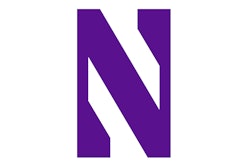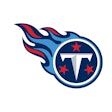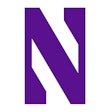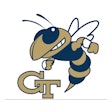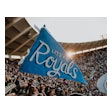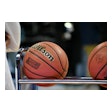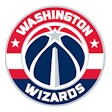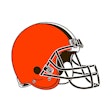Packaging food with tickets has yielded agreeable sales strategies for teams and concessionaires alike.
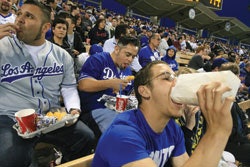 CONSUMER ADVOCATES
CONSUMER ADVOCATESFor 70 of 81 home games last season, the Los Angeles Dodgers dropped the ticket price in their All-You-Can-Eat Pavilion from $35 to $25.
When Target Field opens next month as the new home of the Minnesota Twins, it will feature a premium seating area behind home plate called the Champions Club. There, fans will have access to a high-end buffet complete with carving stations, pasta, vegetables and desserts. There will also be auxiliary counters from which Champions Club patrons can help themselves to a quick hot dog, soft pretzel or ice cream novelty - or several of each, if they desire. It's all free.
"If a guy wants chateaubriand and filet mignon, that's all free, too," says John DePaola, principal-in-charge of Fredericksburg, Va.-based Foodservice Resources, the firm that helped design Target Field's culinary infrastructure. "But, you know, during the game, people still want a hot dog. And by the fourth inning, kids want ice cream. So you come in and get them a Dove Bar."
At the new Yankee Stadium, which debuted its bi-level Legends Suite Club last season, fans don't even have to come in. Waiters bring the fare (everything but alcohol is free) right to their seats.
Enticing ticket purchasers with the promise of free food has become an agreeable sales concept among a growing number of sports entities and their concessionaires. And though it began within the opulent confines of all-inclusive stadium clubs, it has branched out into the cheap seats. Entire sections offering unlimited hot dogs, popcorn, peanuts and soda are now offered in most Major League Baseball parks.
Of course, "free" is a bit of a misnomer. While no money is being exchanged for food items at the would-be point of sale, the ticket price typically has been padded to reflect potential consumption. An alternative strategy - the value-added ticket - gives fans the option to pad the ticket price themselves, with the knowledge that they will enjoy bar-coded credit once they're at the ballpark.
All-inclusive tickets already carrying a high price (the best seats in Target Field's Champions Club, for example, cost a hefty $275 per game) typically attract a more reserved fan, according to concessions consultant Chris Bigelow of The Bigelow Companies Inc. in Kansas City, Mo. But the value-maximizing nature of those who opt for all-you-can-eat general seating may require annual program adjustments on the part of the concessionaire. "It's like anything in the catering business - you're taking a stab at what you think is going to play out," Bigelow says. "After one season, you adjust baselines."
"Every concessions stand operates with a controllable - whether it's a cup, a popcorn box, a nacho boat or a hot dog bun - and let me tell you, the concessionaires watch those controllables like a hawk," DePaola says. "They take each controllable, and they know the starting count and the ending count. That's how they do inventory, and that's how they calculate their food costs. They track the number of would-be sales in this all-you-can-eat format, and they just bill the team back for it."
Some all-you-can-eat programs limit how many items a single person can request during each visit to the counter. Others may cut off all food and beverage in the seventh inning. But for every shameless hot dog gobbler in the crowd, there is typically a friend or family member who may not consume much at all. "The concessionaire is going to get paid for every one of those hot dogs," says DePaola. "The team will say, 'We'd rather have butts in the seats and get the parking, novelty and beer sales - things that people will buy during the same visit - while we underwrite the low-cost items.'"
"The goal is to sell unused seating inventory," Bigelow says. "Most teams took the best seats behind home plate and just made them even better with this all-inclusive package. But what teams are doing now is taking the last seats to sell out - in the case of the Dodgers, that right-field pavilion that sat empty for all but maybe a half-dozen games a year - adding the food, and people love it."
Teams are learning to love it, too. Bigelow estimates that as many as three-quarters of the 30 MLB teams currently offer an all-you-can-eat seating section. It makes economic sense. "Let's say it was a $25 ticket before, but it wasn't selling. The team was getting zero," Bigelow says. "So now let's say it stays at $25, but the caterer is getting $10 and the team's getting $15. Both are taking a little less than what they may have gotten if people were in there, but they're getting a lot more than when that space is empty. So everyone works on a little tighter margin, but 60 percent of something is better than 100 percent of nothing."
 PHILADELPHIA FREEDOM
PHILADELPHIA FREEDOMThe Phillies Power Ticket allows fans to purchase food and novelties at any of Citizens Bank Park's 200 points of sale.
A potentially more lucrative approach for teams is the value-added ticket. Here, a dollar amount is credited to the printed ticket's bar code, which can then be scanned at food, beverage and merchandise stands in lieu of cash transactions. The birth of the idea, in 2004, coincided with the opening of Philadelphia's Citizens Bank Park. "There is a private club behind home plate, and the Phillies wanted to facilitate an experience where fans could easily get food and beverage," says Brian Hastings, a regional director for CBP concessionaire Aramark. "Discussion started on an all-inclusive - as much as they could eat off the buffets and the action stations and the bars. From there it went to, 'Well, we also want them to be able to eat anyplace in the park.'"
By the 2008 season, any fan wishing to sit anywhere in Citizens Bank Park could choose to upgrade his or her ticket to a Phillies Power Ticket by adding same-as-cash credit.
Whereas all-you-can-eat ticketing can be handled with no additional technology (though extra security personnel and/or the use of wristbands may be required), value-added ticketing dictates an investment in bar-code scanners at every point of sale (Citizens Bank Park bought 200 scanners at $275 per unit). But the automation has its benefits. Sales reports and cash reimbursements from the team to the concessionaire after each home stand are expedited significantly, and inherent flexibility allows specific values to be assigned to different seating levels (the Phillies have for now chosen to limit non-premium ticket upgrades to $10, while a $30 credit comes standard on a subgroup of tickets within CBP's 1,100-seat Diamond Club). "The technology allows us to look at the seat number and, if they're a season-ticket holder, the account name that it's under, as well as what they bought and where and when they bought it," Hastings says.
The Phillies, meanwhile, see the Power Ticket as a means to drive per-capita spending. Says Derek Schuster, the club's director of season-ticket sales, "If the person doesn't show up, we automatically get that money. If they only use $9, we get that extra dollar. If whatever they're getting is $15, they're reaching into their pocket to get an extra $5 and they feel like, 'Hey, I only spent $5 today, really,' so then they may be inclined to buy more. Or they're leaving, have $2 left and say, 'I'm going to get that hat that costs $20, because in my eyes it's only costing me $18 now.'"
Bigelow recognizes advantages in value-added ticketing that all-you-can-eat sections can't deliver. "One of the problems with the all-inclusive is you need to keep the people within a controlled area, so those who didn't pay for it can't get in and get free food. Basically everybody has to eat in the same space," he says. "With a value-added ticket, fans can walk anywhere in the stadium, scan their ticket at a concessions or novelty stand, and spend that money any way they like. They're getting a lot more variety."
Still, one wonders what power beyond food choices the Power Ticket actually provides fans. After all, they're getting what they paid for - no more, and potentially less. At least all-you-can-eat attendees can game the system in their favor somewhat through sheer gluttony. Proponents point to the ability of parents to load tickets for their kids, who then don't have to carry as much cash, if any, at the ballpark. It can be an added perk for groups, or individuals who have been gifted tickets. Kansas City's Kauffman Stadium, another Aramark client, began offering value-added tickets in different increments in certain seating sections last season, and Bigelow, a Royals season-ticket holder, was immediately on board. "One of the reasons I went to my section was I thought this was a clever idea," he says. "If I hand out my tickets to customers, I can say, 'Hey, the first twenty bucks is on me.'"
While dollar hot dog nights are still popular at Citizens Bank Park, the Phillies and their concessionaire have no plans to implement an all-you-can eat seating section outside its upscale Diamond Club. (In fact, only two Aramark client venues - PNC Park in Pittsburgh and Turner Field in Atlanta - offer both value-added tickets and all-you-can-eat seating.) In Philadelphia, where 73 of 81 home games sold out in 2009, few added incentives are needed to move seating inventory.
Clearly, that could change with the fortunes of the team, cautions Schuster, who adds that tweaks to the Phillies Power Ticket are possible, too. Last season, roughly 1,000 of the 43,500 fans at any given game held a Power Ticket, including the 300-plus Diamond Club patrons who had no choice in the matter. "We're always experimenting," Schuster says. "In the future, maybe we'll do a $10, $15 and $20 option. For now, we don't want to charge too much and overprice it. We thought that $10 was a fair amount of money that's at least going to get you something at the ballpark."
"We do believe that the Power Ticket fits best for this ballpark and the overall experience that you have down here," says Aramark's Hastings. "We're known for our foods. We don't want to just drive fans toward a singular experience of all-you-can-eat popcorn or hot dogs. We give them options. 'Try our barbeque, our cheese steaks, our Philly Italian pork sandwiches. Hey, try anything you like.'"
Like Bigelow, Hastings predicts more teams will soon give value-added ticketing a try. "As it gains greater acceptance and wider usage, we think it's going to continue to expand," he says. "It's not necessarily going to revolutionize the industry, but as an optional amenity for fans, and in the right situations, it works very, very well."
Trimming the Fat
 Photo of a ballpark hotdog
Photo of a ballpark hotdogLike all-you-can-eat seating sections, the priciest all-inclusive ballpark settings are subject to constant reevaluation - not only between seasons, but on the fly. New York Yankees executives, embarrassed by the empty seats encircling home plate in their state-of-the-art stadium last spring, had by the end of April cleaved in half the $2,500 single-game admission to the Legends Suite Club, while reducing $1,000 Legends tickets by 40 percent.
Food offerings in this context may seem like a footnote, but they're open to scrutiny, too. "Believe me, it's a balancing act like you've never seen before," says John DePaola, whose culinary consulting firm Foodservice Resources is working with the Yankees this off-season. "We're making slight adjustments to the product offering to match the price point that the executives feel will optimize these seating areas."
Meanwhile, concessions consultant Chris Bigelow offers evidence of a shift in the mind-set of corporate ticket buyers. "It's interesting. The one negative thing I've heard about the all-inclusive was one of the teams saying that it has actually hurt their suite sales," Bigelow says. "Suites have been the tough sell right now because of the economy, and some people say, 'You know what? I can't fill 16 seats every baseball game, but I'll buy four of these all-inclusive, high-end club seats, and my customers actually like that better.' So we've seen people trade down to the all-inclusive because they actually claim it's a better sales tool."
And one with fewer surprises, adds Bigelow. "The complaint that we hear, particularly in today's economy, is, 'I just spent $200,000 for a suite, and now these food and beverage bills are killing me every game. If I get into an all-inclusive area, I know exactly what my costs are.'"










